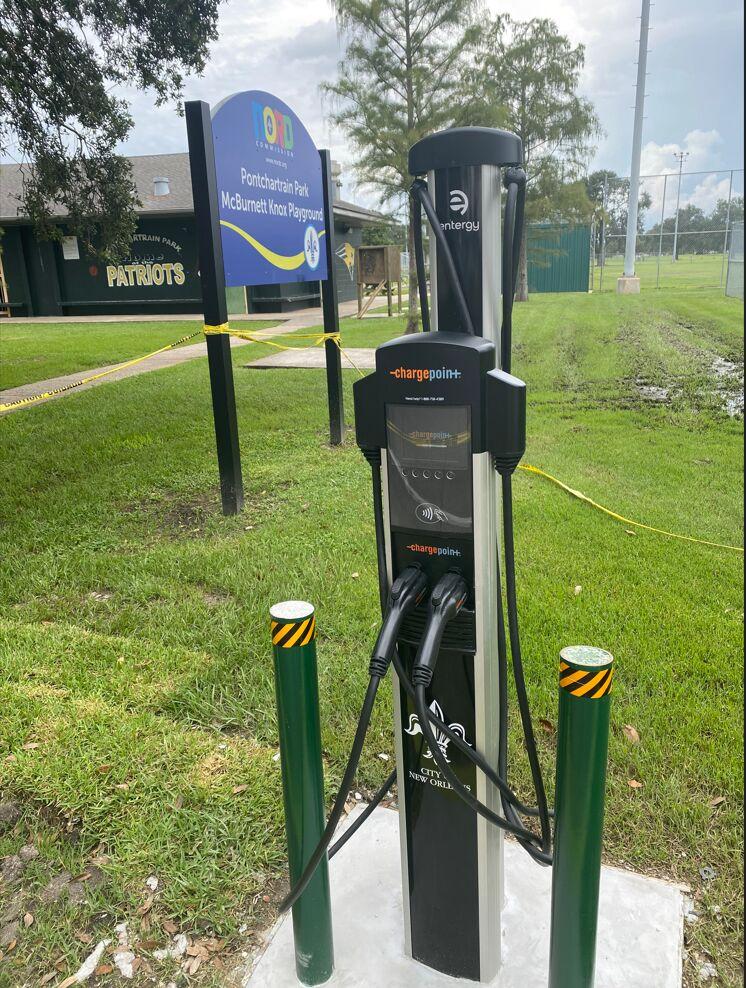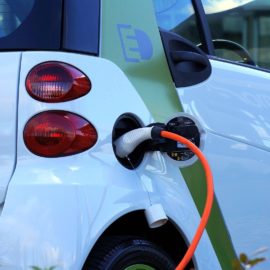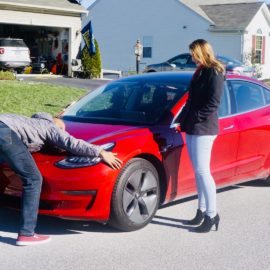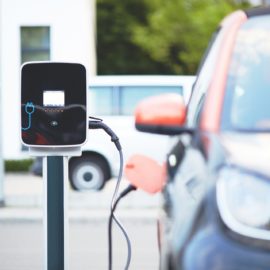
EV’s are sought after but the big question is where, if not at home, can I charge them?
Alex Katz has been selling electric vehicles at his luxury preowned car dealership, NOLA Motorcars, since 2013. EVs have always been a curiosity, but these days, interest is surging at his Metairie showroom. “When people walk in, anything electric is the first one everyone goes up to,” Katz said. Despite the fascination, most buyers still can’t bring themselves to take the plunge, even though there are more models, longer-range batteries and an upcoming $7,500 federal tax credit for EVs assembled in the U.S. “The general consensus is, ‘I’m not ready yet,” Katz said. The reasons for sticking with gas-powered vehicles are many, but chief among them is a lack of available charging infrastructure, both the standard Level 2 stations that take several hours and the rarer, ultra-quick, DC fast chargers and Tesla Superchargers, which can do the job in 30-45 minutes.
nola.com
That may be changing due to the Infrastructure Bill which gives money for charging stations.
That could begin changing in the next few years, though, as New Orleans adds 30 Level 2 chargers in underserved neighborhoods and the state gears up to spend almost $100 million to put fast chargers along regional interstate corridors. Experts say both initiatives should help raise the profile of electric vehicles among consumers and ease the omnipresent worry about not being able to find a charge, particularly in a region where people need to evacuate for hurricanes. “It’s called range anxiety, and it’s a very real thing,” said Katz, noting he had a customer return a Chevrolet Bolt after spending a day “freaking out over where to charge it.” “He decided it wasn’t for him,” Katz said. “We definitely need more charging infrastructure, but I tell my customers: treat it like an iPhone, plug it in every night for a full charge the next day.”
The vast majority charge the cars at home, but that is an expense as well.
An estimated 80% of electric vehicle charging takes place at home, and local owners of EVs say that while range anxiety is real, it often looms larger in the imagination than reality. Chargers can be installed in a garage or along a driveway, and in 2017, the New Orleans City Council created a permit for those without offstreet parking to put a charger in the public right-of-way. This was the case for Melanie Sheen, who bought a Nissan Leaf almost four years ago and has never regretted it. “Now that we have the charging spot in front of the house, it’s been great,” she said. “It hasn’t been a problem at all.” Sheen, an Ochsner oncologist who lives Uptown with her husband and two children, said the battery life on her Leaf is more than enough for her daily needs. “I love it, it’s such a fun little car to drive,” she said. “But I also like that I don’t have to go get gas, and I’m doing my part for the environment, reducing my carbon footprint.”
The advantages of an EV are the main reason people buy them.
Brian Burns, a local chef and restauranteur, said his family got a Leaf in 2014 to save some money on his wife’s commute to teach in St. Bernard Parish. At $13,000, it was the most expensive car they had ever bought, but Burns said the money saved by not buying gas and having essentially no maintenance issues have made it more than worth it. “It’s been an absolute dream not to have to deal with any of that,” he said. Both said they charge their EVs overnight and rarely worry about it. Still, as the number of electric cars in New Orleans creeps up, available chargers at places like Whole Foods and Louis Armstrong International Airport are harder to come by. And Sheen and Burns agree the city needs more charging stations. On that count, there are two developments current and prospective EV owners can take heart in.

Change is coming and it will help the owners.
The first is the rollout of 30 public, free-to-use chargers the city and Entergy New Orleans are installing in 25 locations by the end of the year. The first was opened late last month in Pontchartrain Park, and the others will be placed at parks, libraries and other public facilities with a focus on putting them in places where Level 2 chargers currently aren’t available. The public charging initiative stems from a 2018 agreement between the City Council and Entergy, and council members made up half of the committee that took the public input on where chargers should be located. Dan Jartres of the city’s Office of Resilience and Sustainability said that if the location of chargers is left entirely up to commercial providers, then chargers will only be available where the demand already is. He also said the city’s goal is to help encourage more people to consider buying EVs and to have the infrastructure there when they do. “People are going to balance their desire for cost savings or environmental benefits against practical concerns,” he said, which includes not only the availability of chargers but whether they are in locations where they can pass the time while they charge. Unlike fast chargers, Level 2 chargers are not analogous to gas stations and tend to be located where people will spend a lot of time, whether it’s home, work or shopping and recreation centers.
The major corridors of traffic need them as well.
The second surge in charging capacity will come from the state, thanks to last year’s federal Infrastructure and Jobs Act, which includes funds for states to install fast chargers along regional corridors. Tyler Herrmann, co-director of Louisiana Clean Fuels, the nonprofit that is working with the state on the project, said Louisiana will get $73.4 million in federal money that, when combined with local matching dollars, will amount to $95 million for fast charging stations along the I-10, I-12, I-49, I-55, I-20 and U.S. 90 corridors. Herrmann said the program will put charging stations no more than 50 miles apart and within a mile of the corridor. Once this coverage is achieved, others could be located in underserved areas or places important for hurricane evacuation. The state’s five-year plan is awaiting approval by the Federal Highway Administration by the end of the month, but the proposal is for 75 stations with at least four chargers each, with more at chargers at stations nearly highly populated areas.
Cost will be a factor here as fast charging stations are not cheap.
Fast charging stations, however, aren’t cheap. The plan estimates the cost to be between $100,000 and $300,000 per charger, though the actual amount won’t be determined until contracts are awarded and will depend heavily on what each applicant wants to build. In addition to the physical infrastructure such as concrete pads, trenches, canopies, bollards and lighting, the stations could include their own transformers, a back-up battery and internet connection for the data transfer required for fast charging a vehicle. The chargers might also include more than one type of input so they can be used by older EVs. The estimates also include the first five years of maintenance and operation. The stations will be owned and operated by the commercial or public entities that submit qualifying proposals, but the program aims to make sure the costs are covered for the first five years. Herrmann said the first charging station could be built in late 2023. He said there is a chicken-and-egg relationship between vehicles and charging capacity — people don’t want to buy EVs if there aren’t enough chargers, but no one wants to build charging stations if there aren’t enough vehicles to make it worth the investment. “I think this funding is going to go a long way to alleviating that barrier,” he said.
Barriers remain as we are low on the number of EV’s sold.
Louisiana ranks 46th in the nation based on the market share of EVs among all vehicles sold in 2019. Experts and local EV owners say that’s because there are other impediments beyond range anxiety. Electric vehicles tend to cost a bit more than their gas-powered counterparts, despite some affordable entry-level models like the Leaf and Bolt. Hermann said a new Bolt costs about $26,000, while Katz, the dealer, said a used 2013 Leaf goes for about $10,000, provided a buyer can live with a battery that’s good for only about 80 miles per charge. For those who can spend more, waiting lists are common, as global demand soars for highly coveted models. Burns has been so happy with his Leaf that he’s in line for a Ford Lightning EV pick-up truck, but he’s been on a waiting list for well over a year.
Home charging is the cheapest way to keep them running.
The high percentage of renters and older homes without off-street parking present unique challenges as well. The more a driver pays to charge, the less financial advantage there is to owning an EV, Herrmann pointed out. The Level 2 chargers, which can take 4 to 5 hours to fully charge at a cost of about $14, are twice as expensive as charging from home. Home charging, he said, is a third of the cost of fueling a gas-powered vehicle. “That home charging piece is pretty crucial,” he said.
Tesla wants to sell the EV’s online but Louisiana prohibits that.
Tesla argued in a lawsuit filed recently that the state’s laws prohibiting direct-to-consumer sales of vehicles has been preventing Louisiana from fully participating in the EV revolution. For the time being, at least, Louisiana residents who want a Tesla have to buy it online. Tesla owner James Miller said he wishes there were more charging stations in New Orleans, and he still considers his other, gas-powered vehicle essential, particularly because of hurricanes. But he has enjoyed his Tesla since he got it about a month ago. “It will be a tough transition, but so was gas when we stopped riding horses,” he said recently at the Tesla Supercharger station in Metairie. “Everything is tough at the beginning. I still like gas — I won’t lie, three or four minutes and I’m out. But here I sit. I might as well read a book.”
EV’s will be the wave of the future so the charging stations are a must.



